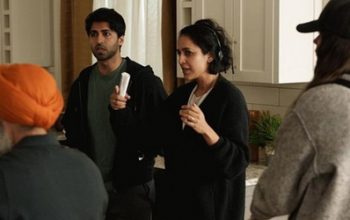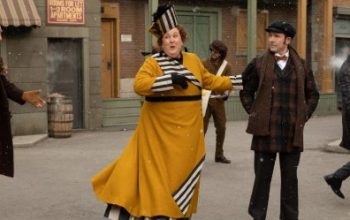On Monday’s new Coroner, Jenny and Mac take on a case that’s much more than it initially seems after the discovery of a dismembered victim. In the course of the investigation, Jenny bonds with a young woman they interview.
[Warning: General spoilers ahead.]
At home, Ross is still figuring out his next steps. When he takes an interest in helping Liam out around the property, Jenny has to navigate the line between parenting and grieving. It’s another episode that allows the cast to shine, written by Sean Reycraft and directed by Adrienne Mitchell.
In the next part of our interview with series creators and executive producers Mitchell and Morwyn Brebner, we discuss block shooting, putting the writing team together, and how their cases weave current societal issues.
The first season was block shot, which means episodes were shot in bulk, with the cast and crew working on multiple episodes at a time. Mitchell took the helm on the block of the first four episodes. “We thought a really good way to work the first season would be to block shoot the first four episodes and really set the cinematic style of the series,” she says.
“It was my first time block shooting four. It was very interesting. when you block shoot four, everybody feels like they’re doing a movie. Everybody’s sensibilities rise.”
“There was an enormous amount of detail juxtaposing nature and city. The city is congested and so much in transition. People and animals are getting pushed out. We’re dealing with cases that are a symptom of all of that in a strange way. Jenny is going though this transition the same way.”
“We needed something visual that would give that reflection and that was her farmhouse in the woods. We were able to establish that stance and set up the rest of the season.”
Brebner says they staffed the writers room with an eye toward both talent and diversity. “We got the order very quickly and had to staff very quickly. It was important to have writers from diverse backgrounds in the room to represent [Toronto] authentically,” she explains.
“That was a priority. And find writers who were interesting, great writers. Our writers room was really, really strong, [a mix of] established and up and coming writers.”
“We ended up breaking the stories very intuitively. It was a fascinating process…we ended up working in a way where we tapped into the zeitgeist. There are a lot of things [we wrote eight months ago] that are now out in the world. The scripts had a real energy [that’s apparent in] the finished product. That’s very exciting.”
While certain aspects of the show are definitely in the procedural camp, Brebner says they stayed away from the “ripped from the headlines” fallback and instead developed plot lines that felt organic and current. “You’re working in a way where you’re trying to channel the moment vs. the moment before. When you work on a cop show or medical show, everybody is doing the same story from different perspectives at some point,” she says.
“We felt like our stories should be fascinating and have good turns and have a social resonance and connection. Coroner is so much about, ‘We speak for the dead to protect the living,’ so there has to be a larger societal, systematic or structural context to the stories.”
“We looked for that and tried to build that into the story. There were things we brought in that we knew about it and things that we [came up with] in the room and we had consultants.”
Mitchell adds that the larger real-life bureaucratic issues also informed their stories. “Our systems our so overburdened [from the police to the coroners]. They can’t pay enough attention and detail to what’s happening to suspicious deaths and things get [missed],” she points out.
“It was inspiring us a little bit. In Toronto, we had a series of murders in the gay village that had gone on for a while and things got missed. So we looked to what happens with an overburdened system and how do you deal with that. How do you try to make change? We do explore that.”
“I feel like the common perspective is the system is broken but society needs systems to survive,” Brebner adds. “The idea that as an individual you’re alone. The series comes from the inter-dependency of people. We need each other to build things that hold us together.”
Coroner airs Monday night at 9 pm ET/9:30 NT on CBC and streams online on CBC Gem. [Updated 8/4/20: Beginning 8/5/20, Coroner will air Wednesdays at 9 pm ET on The CW in the U.S.]
Here’s a sneak peek of “Scattered.”






One thought on “Coroner “Scattered” Preview + Morwyn Brebner and Adrienne Mitchell Interview”